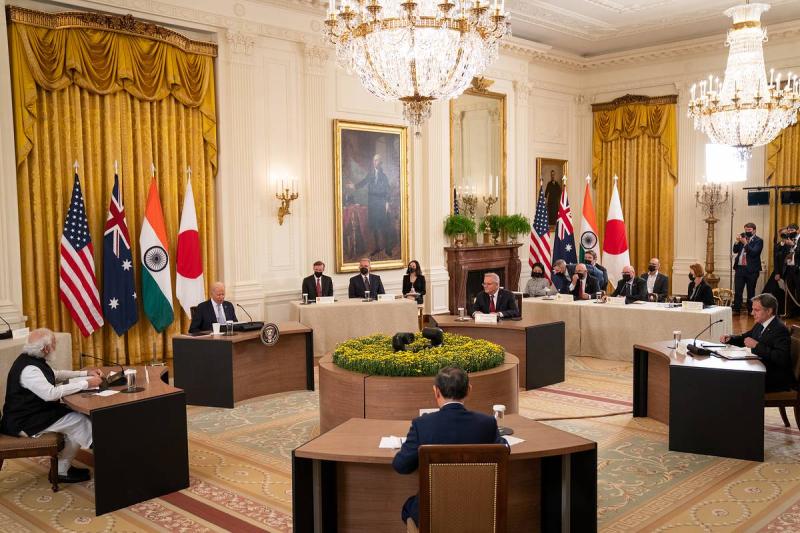
© EPA-EFE/Sarahbeth Maney/POOL/TASS
Australian Prime Minister Anthony Albanese has arrived in India on a three-day state visit seeking to “strengthen the new momentum in ties between the two countries through deeper trade, investment and defense relations,” India’s The Hindu reports. Notably, an Australian PM last visited that country in 2017, and this year this happened just a few days before the arrival of Japanese Prime Minister Fumio Kishida in New Delhi. The two events have one thing in common – Australia, India, Japan, and the United States are part of the so-called QUAD (Quadrilateral Security Dialogue) group.
Decision by Indian Prime Minister Narendra Modi, who is this year's G20 chairman, to invite the Australian leader to India reflects determination to bring comprehensive strategic partnership and military-technical cooperation to a new level in the face of common threats and challenges. A similar stance, let us note, is taken by the Australian leader, who said a stronger partnership between India and Australia was good for stability of the region. "I look forward to hosting PM Modi in Australia mid-year for the QUAD Leaders' Summit and to revisiting India in September for the G20 Leaders' Summit," Albanese said.
Small wonder that the Australian Prime Minister mentioned defense cooperation with India and the upcoming QUAD summit set for May 24. A priority issue of Albanese's meetings and talks in India was New Delhi and Canberra’s unified efforts amid their growing confrontation with China, making both leading Indo-Pacific countries increase military spending and intensify joint naval exercises. So, as early as in August this year, the QUAD’s fleets are planned to engage in the annual Malabar Naval Wargaming naval drills that will be for the first time arranged by Canberra.
Today, the QUAD group no longer hides its key objective of resisting China’s growing influence and dominance in the IPR. The leader’s part is meaningful here, as the region produces half of the world's exports, comprises six nuclear states, eight highest defense spending nations and eleven largest arms importers. The one who controls the IPR does actually have keys to all of the world.
Small wonder that ahead of Albanese's visit to New Delhi, former Indian High Commissioner to Australia Navdeep Suri said business relations between the two countries were crucial as regards the QUAD. Also, last week saw the association’s foreign ministers meet in New Delhi at the G20 ministerial summit and bring joint accusations against Beijing. Not daring to name the specific country criticized, they made it crystal-clear it was China, whom the QUAD regard as an existential threat. Hence the increased American activity in the IPR, as it seeks to establish here a new world order based on rules acceptable to America and its allies.
China's influence in the region clearly hinders this, and Washington has rallied up all the dissenters ready to support an explicitly confrontational approach towards Beijing. This refers to both the QUAD group and the AUKUS created by Washington in September 2021 to comprise itself along with Australia and the United Kingdom. It is this block that the United States plans to turn into an "Asian NATO” to dominate the IPR and confront China. And perhaps Russia as well, as a country with access to the Pacific Ocean and one of Beijing's closest partners.
Speaking about the IPR situation, we cannot but say a few words about tensions persisting around Taiwan. The United States keeps selling weapons to Taipei to allegedly help it defend itself against the PRC. In response, the Chinese Foreign Ministry says Beijing will proceed with all the necessary moves to protect its security and sovereignty – hence the constant flights by Chinese combat aircraft over Taiwan and the barrage of Chinese Navy warships in the "rebellious" island’s waters.
Official Beijing's rhetoric has also recently changed in no small way. Thus, dwelling upon US growing military and political activity in the IPR at his recent annual press conference in Beijing, new Chinese Foreign Minister Qin Gang warned the United States, its allies and partners against attempts to create an Asian NATO aimed to contain China. Such a policy is "doomed to failure," he stressed.
" The US Indo-Pacific Strategy, while purportedly aiming at upholding freedom and openness, maintaining security and promoting prosperity in the region, is in fact an attempt to gang up to form exclusive blocs, to provoke confrontation by plotting an Asia-Pacific version of NATO, and to undermine regional integration through decoupling and cutting chains… No Cold War should be reignited, and no Ukraine-style crisis should be repeated in Asia," Qin Gang stated.
According to the chief Chinese diplomat, the United States talks about the need to comply with the rules, though incapable of fair competition itself. Suppression and containment of the PRC will make the United States neither "great again" nor able to stop China’s revival. Tough and unambiguous statements by the country’s top diplomat may indicate Beijing’s readiness to resolutely defend its interests and retain initiative in the region.
In conclusion, let’s draw attention to New Delhi's somewhat intensified activity within the QUAD, which has not yet been observed. This fact unwittingly suggests that Washington manages to gradually draw India into its plans of confronting China. In this regard, the question arises as to whether the United States succeeded in subduing India and forcing it to abandon the non-alignment principles?
However, when asked which camp India numbers itself among, whether it be the US-Chinese confrontation or the conflict between Russia and Ukraine, official New Delhi usually refers to the "Indian" one. In other words, dissimilarity from all the others is an important foreign policy component of the country that has so far enjoyed utter independence and sovereignty. Long may it continue…









